September 20, 2025
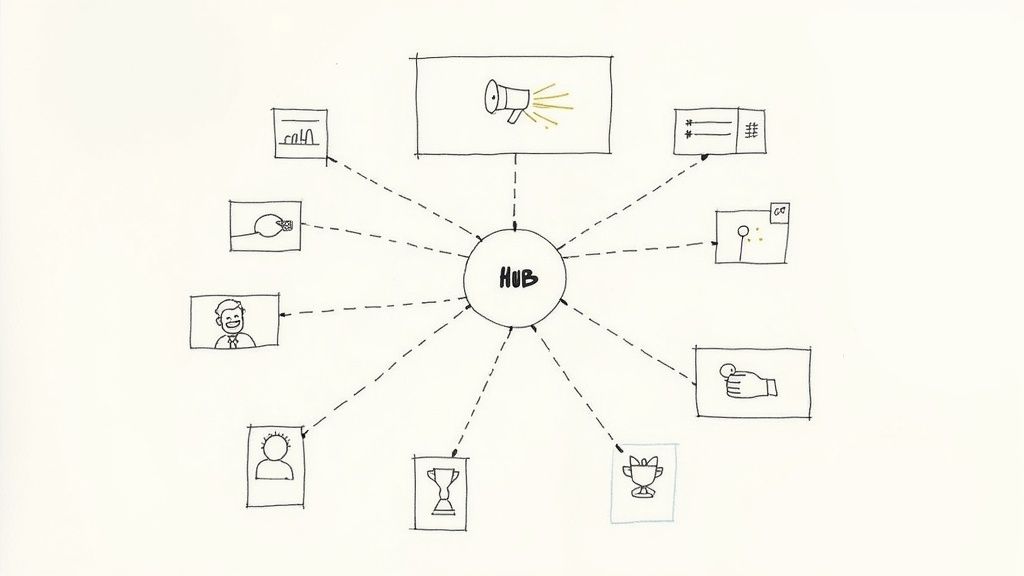
An unforgettable event starts long before the doors open. It begins with a spark of excitement, a sense of urgency, and a compelling reason for attendees to choose your event over countless others. In a crowded market, even a brilliant concept needs a strategic promotional plan to build momentum, create buzz, and drive registrations. This guide cuts through the noise to deliver powerful and practical promotion ideas for events that secure a full house.
We'll move beyond the basics, providing actionable steps and real-world examples to help you execute each strategy effectively. You'll learn how to implement proven tactics like exclusive early bird pricing, social media giveaways, and influencer partnerships. We will also explore how to leverage referral programs and strategic cross-promotions to expand your reach.
Each idea is designed to be a clear, actionable component of a larger campaign. We will demonstrate how an all-in-one platform can streamline these efforts, integrating your marketing, registration, and attendee management. By the end of this list, you'll have a toolkit of nine distinct strategies to transform your promotional plan from an afterthought into the driving force behind a sold-out success story. Let's dive in.
Exclusive early bird pricing is a powerful, time-sensitive promotion that rewards your most enthusiastic attendees with a significant discount for registering early. This strategy creates a strong sense of urgency, driving initial ticket sales and securing crucial cash flow long before the event date. By offering a compelling incentive, you build momentum from day one.
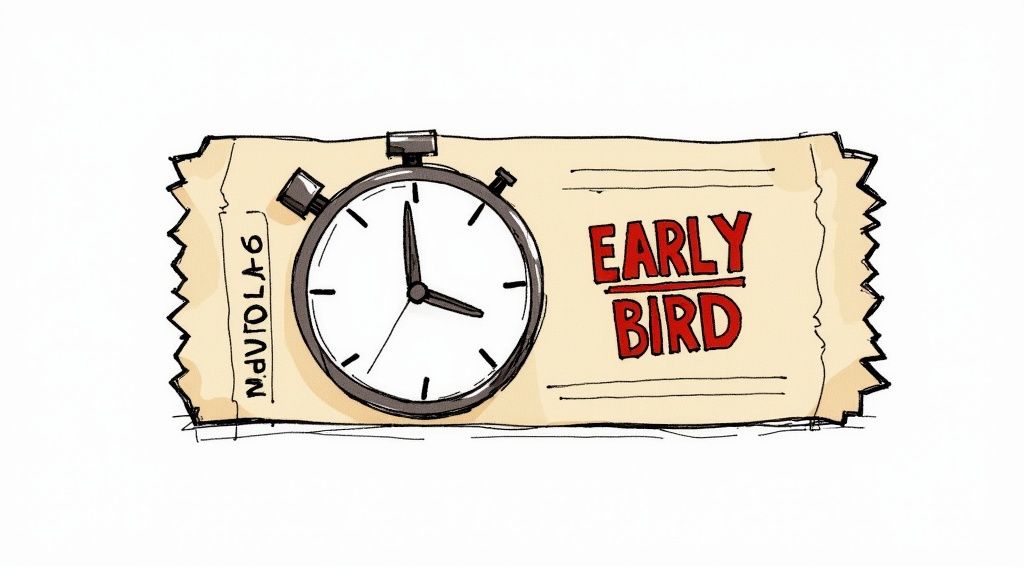
Major events like SXSW and Comic-Con International have mastered this technique, offering discounts of up to 40-50% months in advance. This not only guarantees a foundational audience but also provides invaluable data on attendee interest, helping you fine-tune your marketing efforts.
To make this strategy work, you need a clear plan that maximizes both urgency and value. This isn't just about a simple discount; it's a core part of your launch campaign.
Social media contests and giveaways are interactive promotion ideas for events that turn your audience into active brand advocates. These campaigns encourage user-generated content and social sharing in exchange for prizes like free tickets, VIP experiences, or exclusive merchandise. This strategy leverages social proof and network effects to exponentially increase your event's visibility and generate authentic buzz.
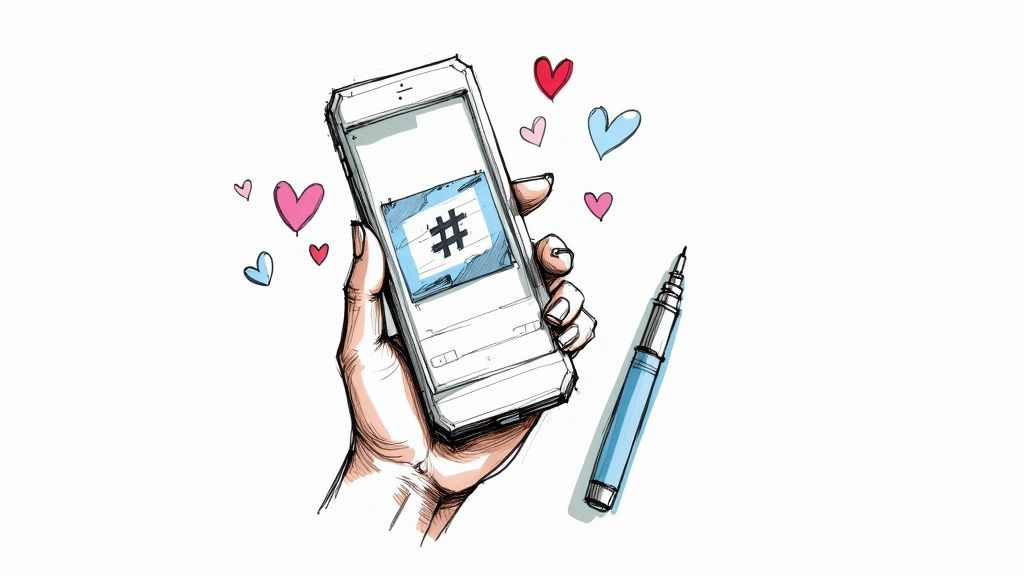
Major music festivals like Coachella master this by running Instagram photo contests that generate millions of impressions. Similarly, a business conference can run a LinkedIn contest asking attendees to share their best networking insights, driving professional engagement while promoting the event to a highly relevant audience. These campaigns create a powerful, organic marketing loop.
A successful giveaway goes beyond just offering a prize; it requires a strategic approach that aligns with your event goals and engages your target audience effectively.
Influencer partnerships leverage the trust and reach of established content creators to promote your event to their dedicated followers. This strategy taps into pre-built communities, allowing you to connect with your target audience through a credible, authentic voice. By collaborating with influencers and brand ambassadors, you can generate organic buzz and drive ticket sales far more effectively than with traditional advertising alone.
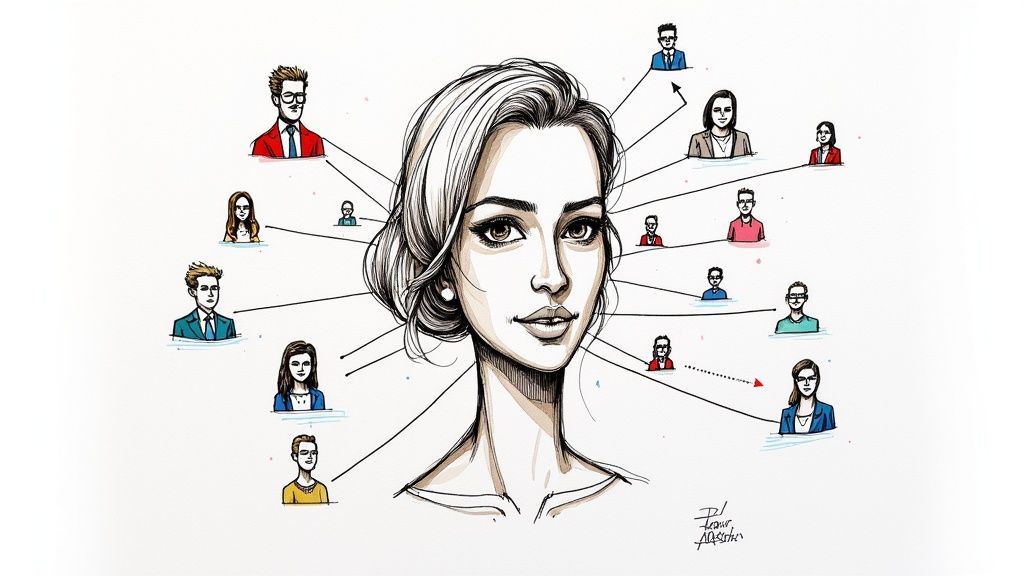
Major music festivals like Coachella partner with lifestyle and music influencers on Instagram and TikTok to showcase the event experience, while tech conferences collaborate with industry thought leaders on LinkedIn to boost credibility. This approach turns influential voices into powerful advocates, making it one of the most effective promotion ideas for events seeking authentic engagement.
A successful collaboration requires more than just sending free tickets. It demands a strategic approach that aligns with both your event goals and the influencer’s brand.
Strategic partnership cross-promotion is a powerful marketing tactic where you collaborate with complementary businesses or organizations to promote each other’s events. This approach leverages the trusted relationship your partner has with their audience, allowing you to reach a new, highly relevant group of potential attendees without a significant financial investment.
This method is common across many industries. For instance, a tech conference might partner with a SaaS company, or a local food festival could collaborate with nearby restaurants and culinary schools. The key is mutual benefit: you gain exposure to their audience, and they gain exposure to yours, creating a win-win scenario that expands reach for both parties.
A successful partnership requires more than just a handshake; it needs a clear, mutually beneficial agreement. This approach is one of the most effective promotion ideas for events when executed thoughtfully.
Targeted email marketing campaigns are one of the most effective promotion ideas for events, allowing you to nurture leads from initial awareness to final registration. This direct communication channel enables you to send personalized content, detailed updates, and strong calls-to-action to a segmented audience, building a relationship and driving conversions over time.
Event platforms like Eventbrite excel at this with automated reminder sequences for abandoned registrations, while major conference organizers use weekly newsletters to announce new speakers and maintain excitement. This strategy keeps your event top-of-mind and provides a reliable, high-ROI channel for ticket sales.
A successful email campaign goes beyond a single announcement. It requires a multi-phase sequence that guides potential attendees through the decision-making process with valuable and relevant information.
Group discounts and corporate packages are volume-based pricing strategies that incentivize companies and organizations to purchase tickets in bulk. This approach significantly boosts attendance numbers by making it more affordable and convenient for teams to attend together. By offering a progressive discount, you appeal directly to budget-conscious departments and foster a collaborative event experience.
This bar chart illustrates a common tiered discount structure, showing how savings increase with group size.
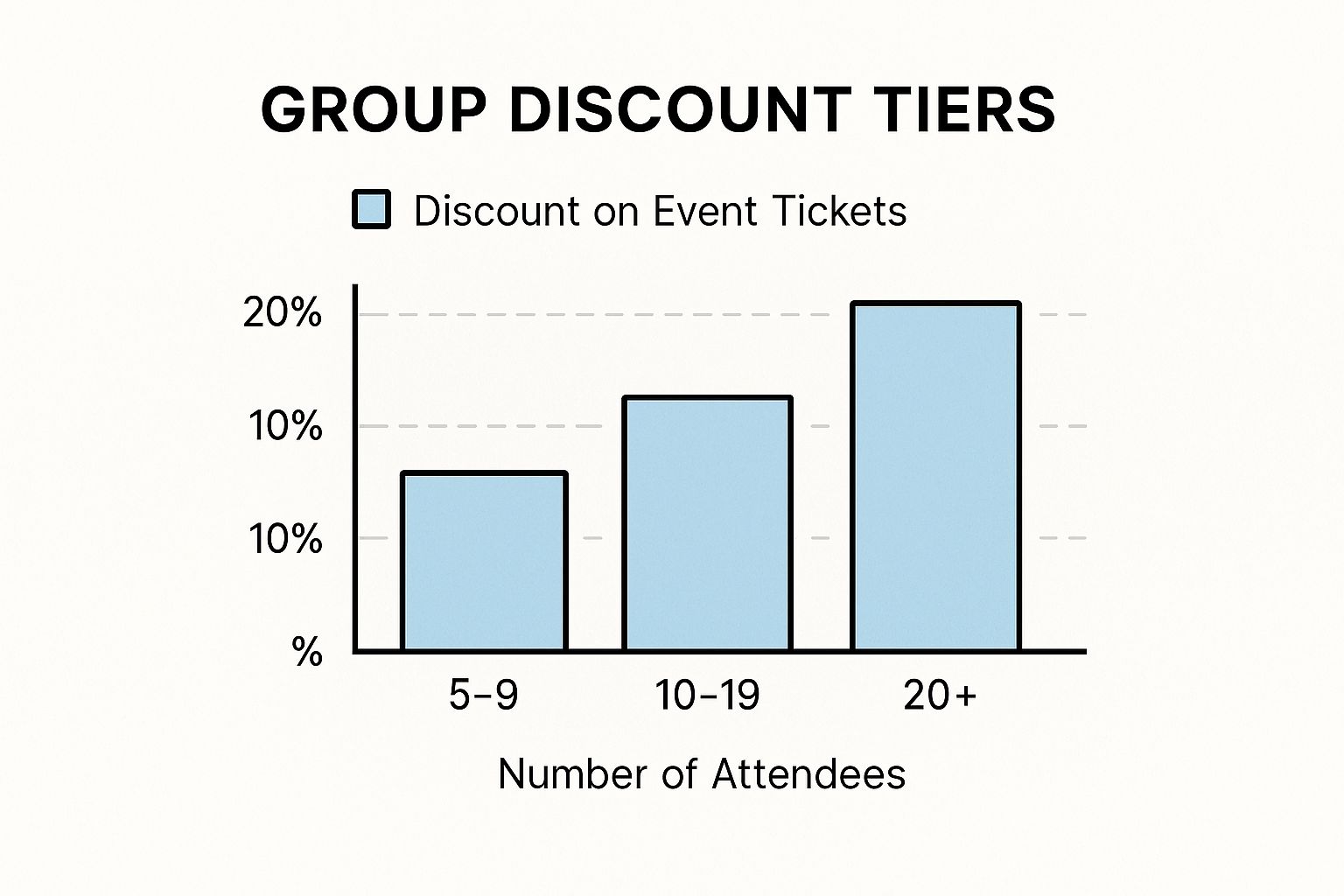
The visualization clearly shows that the larger the group, the greater the per-ticket savings, creating a compelling reason for organizations to maximize their team's participation. This is one of the most effective promotion ideas for events targeting B2B audiences.
A successful group package strategy requires more than just a discount; it needs a seamless registration process and clear value propositions that appeal to organizational leaders and HR departments.
Referral and loyalty programs transform your existing attendees into a powerful marketing engine, rewarding them for spreading the word and encouraging repeat participation. This strategy leverages the trust inherent in word-of-mouth recommendations, a highly effective and cost-efficient method for growing your audience while building a dedicated community around your event.
Music festivals like Bonnaroo have successfully used "ambassador" programs, where fans earn points for referrals that can be redeemed for free tickets or VIP upgrades. This turns enthusiastic attendees into active promoters, creating an authentic buzz that traditional advertising can't replicate and solidifying it as one of the best promotion ideas for events.
A successful program is built on simplicity and valuable incentives. Your goal is to make it effortless for attendees to participate and feel genuinely rewarded for their loyalty and advocacy.
Content marketing and thought leadership move beyond direct promotion by offering valuable, relevant content that educates your target audience. This strategy positions your event and its speakers as industry authorities, building trust and demonstrating immense value long before a ticket is ever purchased. It’s a long-term play that nurtures a loyal community.
Global powerhouses like TED have perfected this by creating year-round content featuring speaker insights and event highlights. This keeps their audience engaged continuously, making event attendance feel like a natural next step. This approach transforms your marketing from a simple sales pitch into an essential industry resource.
A successful content strategy focuses on solving your audience's problems, not just selling tickets. This approach builds an authentic connection and establishes your event as a must-attend gathering for industry leaders.
Limited-time flash sales are high-urgency promotional campaigns that offer steep discounts for a very short period, typically just 24 to 72 hours. This strategy is designed to trigger immediate action and capitalize on impulse buying behavior, creating a powerful spike in ticket sales and revenue. It's an excellent way to re-engage your audience and inject excitement during slower registration periods.
Music festivals are famous for using this tactic, often announcing a 48-hour flash sale to sell remaining tickets or boost interest mid-campaign. Similarly, conference organizers might offer a "Midnight Madness" special, providing a deep discount only available for 24 hours to drive a concentrated burst of registrations and create a buzz on social media.
A successful flash sale requires precise timing and coordinated communication to maximize impact. This isn’t just a random discount; it’s a planned, high-energy marketing push.
We've explored a powerful arsenal of promotion ideas for events, from creating urgency with early bird pricing and flash sales to building long-term buzz through content marketing and influencer partnerships. Each strategy, whether it’s a social media giveaway or a targeted email campaign, offers a unique way to connect with your audience and drive registrations. The common thread weaving through all these successful tactics is not just creativity, but cohesive execution.
The true challenge isn't a lack of ideas; it's the operational complexity of managing them. Juggling different platforms for ticketing, email, affiliate tracking, and social media can lead to fragmented data, inconsistent messaging, and a disjointed experience for your potential attendees. This is where the most critical takeaway from this article comes into focus: your promotional strategy is only as strong as the system that supports it.
The most effective event promotion isn't about throwing every tactic at the wall to see what sticks. It's about selecting the right mix of promotion ideas for events that resonate with your specific audience and then orchestrating them seamlessly. Imagine trying to manage a tiered early bird special, a corporate group discount, and a last-minute flash sale using separate tools. It becomes a logistical nightmare prone to errors.
Instead, a unified approach allows you to:
Ultimately, mastering these promotional concepts is about more than just selling tickets. It's about building a thriving, engaged community that views your event as a can't-miss experience. When your promotional efforts are centralized and data-driven, you can personalize communications, reward loyalty effectively, and gather insights that inform not just this event, but every future one. Stop letting scattered systems and administrative headaches dilute the impact of your brilliant promotional ideas. By embracing an integrated platform, you transform your strategy from a series of disconnected tasks into a powerful, automated engine that drives sustainable growth and turns one-time attendees into lifelong advocates.
Ready to stop wrestling with spreadsheets and disconnected tools? See how GroupOS centralizes your ticketing, marketing, and member engagement into one powerful platform, allowing you to execute sophisticated promotion ideas for events with ease. Discover how you can automate your growth and build a stronger community with GroupOS.


